Woman Yells At Sick Sibling For Not Taking Care Of Her Puppy, Calls Her An Animal Abuser
A Reddit user named NovaBelleRiver took to the "AITA" subreddit to recount an incident involving her cousin, who had asked to stay with her for a few days after having difficulties living with her mother. At first, NovaBelleRiver declined the request because her cousin had recently gotten a puppy, and she didn't want to be responsible for it.
However, the cousin showed up at her apartment crying and pleading to stay, and eventually, NovaBelleRiver agreed to let her stay for a short time. Unfortunately, the few days turned into several weeks, and the cousin didn't take proper care of the puppy.
The dog would frequently poop and pee on the carpet, but the cousin wouldn't clean up immediately. Since NovaBelleRiver was often home while her cousin was at work, her cousin would occasionally ask her to help walk the dog.
One day, NovaBelleRiver came home from work feeling ill and decided to nap for a while but ended up sleeping through the night. The next day, her cousin sent a text message accusing her of being an animal abuser because the puppy had soiled its crate.
This led to a heated exchange between the two, and the cousin eventually left. Although NovaBelleRiver felt compelled to apologize to her cousin, as she considers herself a people-pleaser, she did not sincerely mean it.
The AITA community weighed in on whether NovaBelleRiver was in the wrong.
This is OP's story
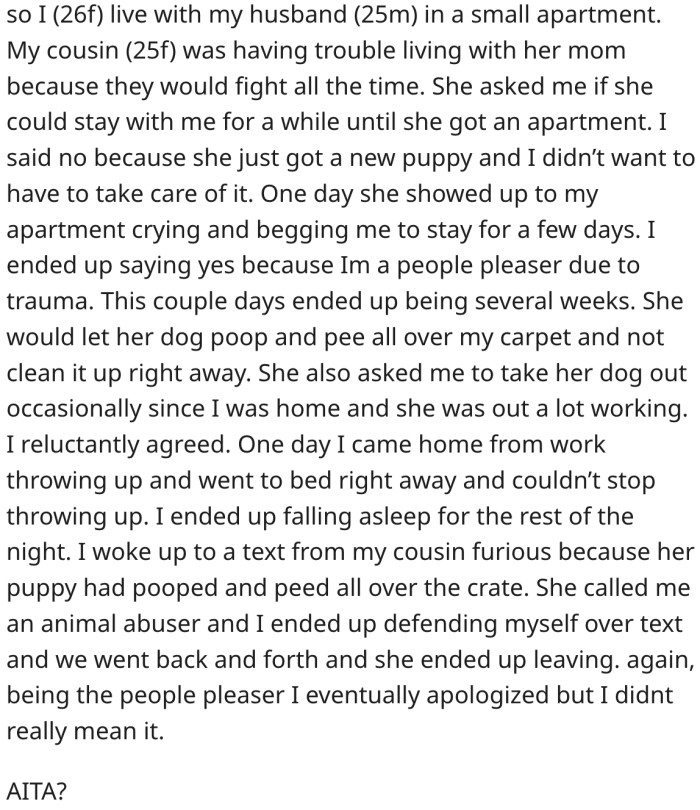
1. Her cousin overreacted
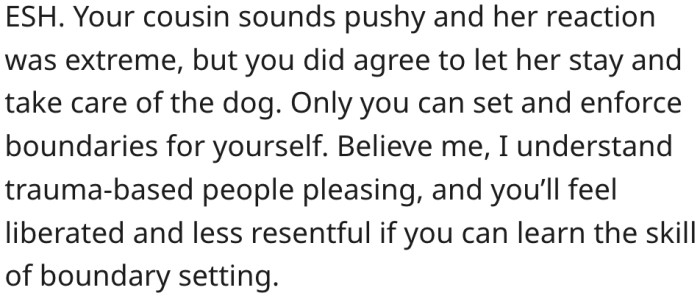
2. She should have set boundaries from the start.

Understanding Emotional Responses
The situation presents a classic case of emotional dysregulation, where intense feelings of frustration lead to an outburst. Research from the American Psychological Association indicates that emotional responses can often be disproportionate to the situation at hand, particularly when underlying stressors are present.
When individuals feel their autonomy or responsibilities are being threatened, they may resort to blame as a defense mechanism to protect their self-esteem.
3. People pleasers must know when to say "no".
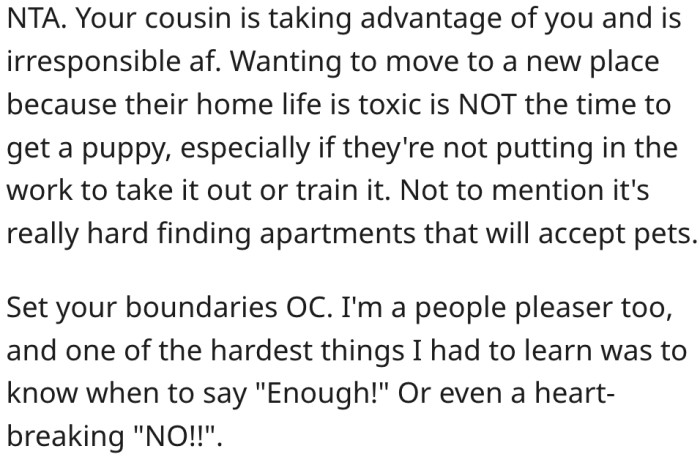
4. Her cousin is asking for too much by wanting her to watch her dog.
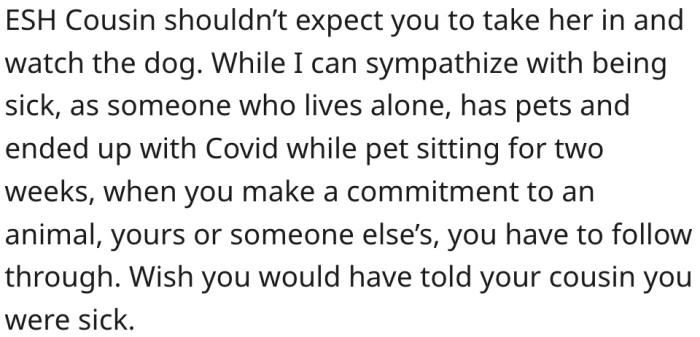
5. She shouldn't have agreed to care for the dog if she wasn't capable.
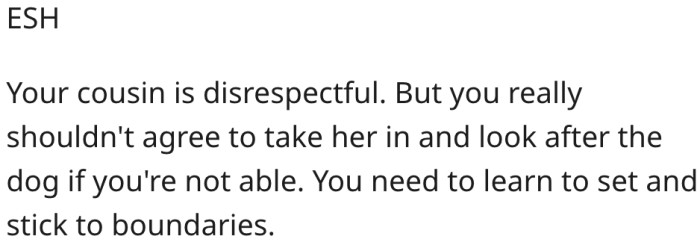
In this instance, the woman’s anger could stem from a deeper sense of helplessness regarding her sibling's illness. According to Dr. Judith Herman, a renowned trauma expert, emotional responses often reflect unresolved issues and personal vulnerabilities.
When individuals express anger, it can sometimes be a mask for sadness or fear, highlighting the complexity of emotional expressions.
6. They both did something wrong.
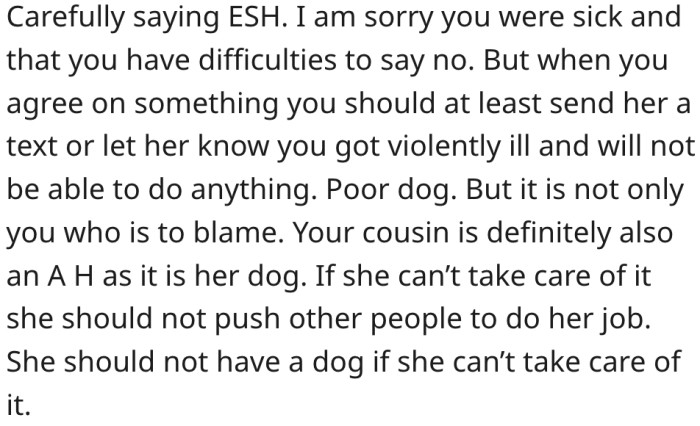
7. She's letting her cousin walk all over her.
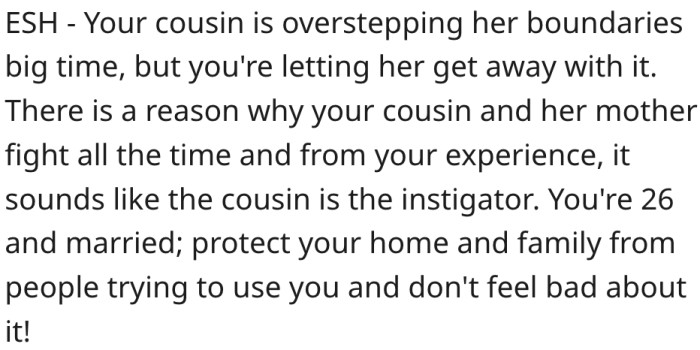
8. Even people pleasers need to set boundaries.
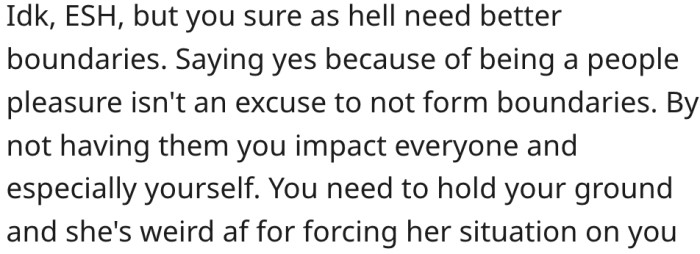
The Psychology of Responsibility
Psychologists often discuss the concept of 'shared responsibility,' especially within family dynamics. A study published in the Journal of Family Psychology shows that expectations of care can create tension, particularly if they are not communicated effectively.
It's essential to have open dialogues about responsibilities, especially when one party is experiencing significant life changes, such as illness.
9. She should kick her cousin to the curb.

10. She has nothing to lose if she cuts off her cousin completely.
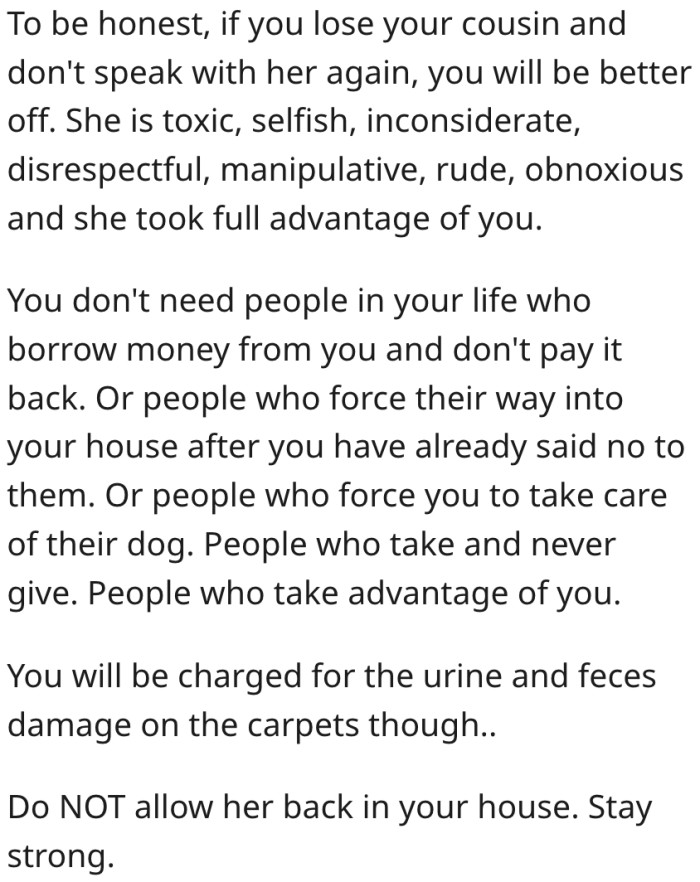
11. It's better to have a few quality people in one's life than to accommodate plenty of low-quality people.

To mitigate conflicts in situations like these, family therapy can often prove beneficial. According to the American Association for Marriage and Family Therapy, structured communication can help family members express their needs and feelings without resorting to blame or anger.
Therapists recommend using 'I' statements, which can foster understanding and empathy rather than defensiveness.
What do you think?
Setting boundaries in our relationships with others is an important aspect of maintaining our well-being and protecting our mental and emotional health. While it may feel difficult to say "no" or establish limits with others, doing so is essential for our happiness and success.
Whether it's with our family, friends, or colleagues, setting clear boundaries can help us avoid overcommitting ourselves, prevent us from feeling used or taken advantage of, and maintain healthy relationships.
Remember that it's okay to prioritize your own needs and desires, and by setting boundaries, you're allowing yourself to live a life aligned with your values and goals. So, don't be afraid to establish clear boundaries and communicate them to those around you.
Your relationships will be better for it, and you'll feel more empowered and in control of your own life. What do you think?
Implications for Animal Welfare
This incident also raises important questions about animal welfare and responsibility. According to the American Humane Society, pet ownership entails a commitment to the animal's well-being, and a lack of care can lead to significant emotional distress for the pet.
Understanding the psychological implications of neglect, both for the animal and the owner, can lead to more compassionate and responsible pet ownership practices.
Psychological Analysis
This situation highlights the common challenge of managing emotions within family relationships, particularly during times of stress. It's crucial to remember that emotional outbursts often stem from unaddressed fears or insecurities, which call for compassionate dialogue rather than blame.
Analysis generated by AI
Analysis & Alternative Approaches
In conclusion, the emotional dynamics at play reflect deep-seated psychological patterns that can be addressed through communication and family support. Research from the Journal of Family Psychology emphasizes that understanding one another is key to resolving familial tensions.
Moreover, recognizing the responsibilities associated with pet ownership can foster a more nurturing environment for both animals and their caregivers.



